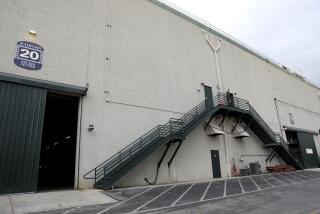WESTMINSTER : $1.1-Million Award in Industrial Suit
A Superior Court jury awarded nearly $1.1 million Tuesday to a 24-year-old man who lost his right forearm and four fingers of his left hand in an industrial accident.
After a two-week trial in Westminster Superior Court, the panel decided last week that Stull Industries of Anaheim was negligent in the December, 1983, accident involving Louis Paul Dunn of Corona. Jurors returned the verdict on damages Tuesday after a second phase of trial.
“This was an instance of callous disregard for worker safety,” said Dunn’s lawyer, Wylie A. Aitken. “Think of all the things you use your hands for: a simple caress, a simple handshake, a wave. Those things are changed forever for Louis Dunn.”
Attorneys for Stull Industries in Anaheim could not be reached for comment. The defense had contended at trial that Stull was not responsible for the accident because Dunn was not their employee but was working instead for Dennis Vlach, an independent contractor to whom it leased space, Aitken said.
But Aitken had argued that as owner of the building, Stull was responsible for the working conditions on the premises.
Dunn now wears a prosthetic device on his right arm. On his left hand, only the thumb remains. Aitken said Dunn has learned to write by gripping a pen between his left thumb and his palm. He has also taught himself to ski and drive.
The accident occurred on Dec. 28, 1983, at Stull’s Anaheim plant, where custom grill parts for vans are made, Aitken said. Dunn, who had been working there only a month, was operating a punch press that exerts 95 tons of pressure to cut metal parts.
Dunn had been told by Vlach to remove each bracket that he made with his hands before moving on to the next one, Aitken said. The machine was supposed to be operating on a “single cycle” basis, which means Dunn should have had time to reach in, remove the part and push a button to trigger a new punch, Aitken said.
But on one occasion, he reached in and the machine converted to “continuous cycle,” bringing the press down on his arms, Aitken said.
The malfunction occurred because the machine was at least 40 years old and its controls had not been installed properly, Aitken said. Barrier guards installed to prevent insertion of the worker’s hands into the machine had been removed before Vlach bought the machine, Aitken said.
More to Read
Inside the business of entertainment
The Wide Shot brings you news, analysis and insights on everything from streaming wars to production — and what it all means for the future.
You may occasionally receive promotional content from the Los Angeles Times.








